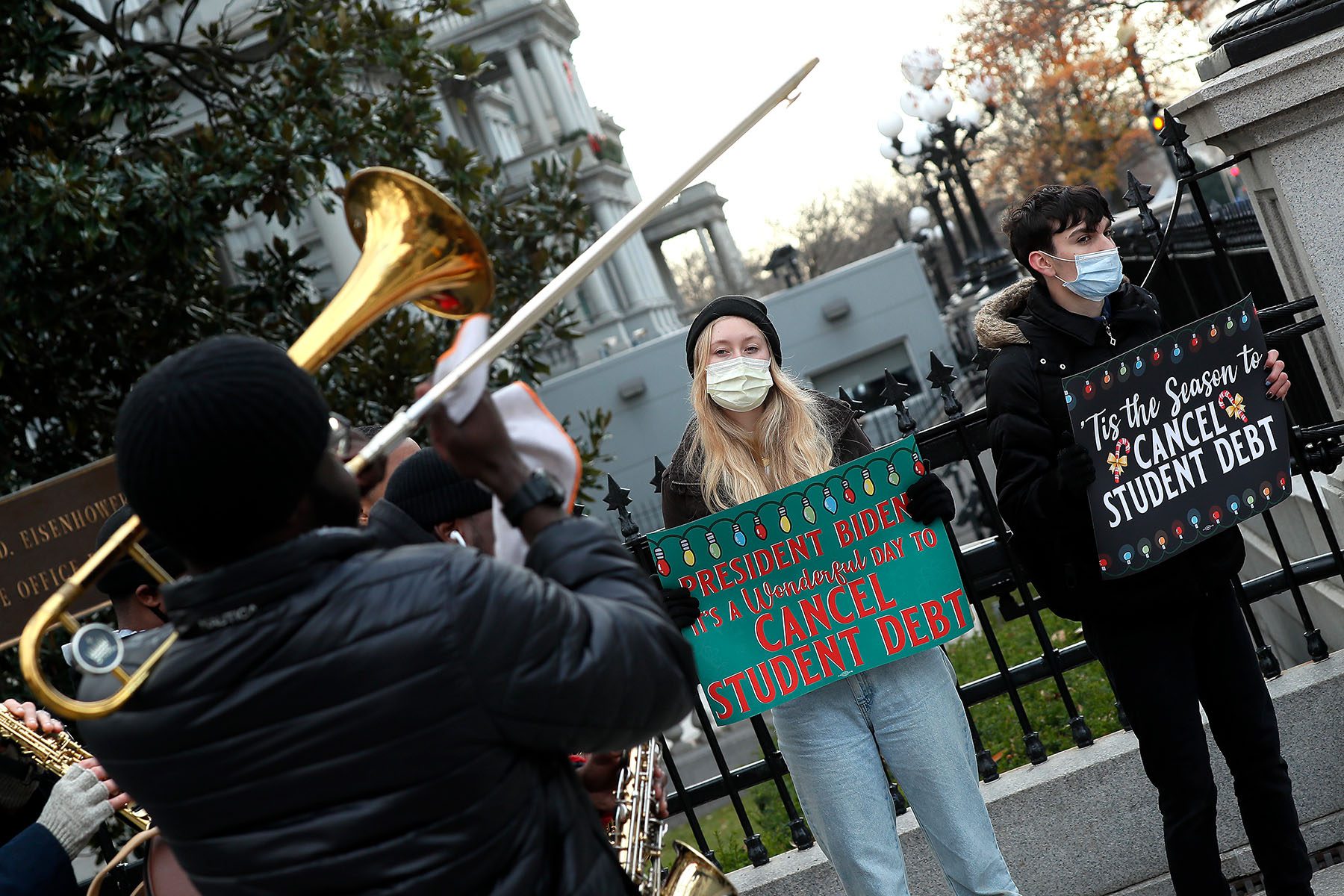President Joe Biden announced Wednesday that he’s extending the pandemic pause on federal student loan payments through May 1, 2022, a move that drew both quick praise from advocates and renewed calls to cancel student debt outright.
A moratorium on payments has been in effect since the March 2020 passage of the CARES Act, a pandemic relief measure that suspended student loan payments interest-free through September 2020. Since then, the payment pause has been extended multiple times, with the most recent set to run out January 31.
“We know that millions of student loan borrowers are still coping with the impacts of the pandemic and need some more time before resuming payments,” Biden said. “This is an issue Vice President Harris has been closely focused on, and one we both care deeply about.”
Americans hold more than $1.7 trillion in student loan debt, and, according to the American Association of University Women, two-thirds of it is held by women. The possibility that student loan payments would resume even as the pandemic continued and millions of borrowers struggled financially had prompted many policymakers, advocates and borrowers to call on the Biden administration to grant another extension. While they applaud the president’s decision to pause payments once more, the ultimate goal, they say, is for the administration to broadly cancel federal student debt.
In a joint statement Wednesday, Rep. Ayanna Pressley, Sen. Elizabeth Warren and Senate Majority Leader Chuck Schumer, all Democrats, said that “the pause on federal student loan payments, interest, and collections has improved borrowers’ economic security, allowing them to invest in their families, save for emergencies, and pay down other debt.” But, the lawmakers said, they “continue to call on President Biden to take executive action to cancel $50,000 in student debt, which will help close the racial wealth gap for borrowers and accelerate our economic recovery.”
Pressley knows what it’s like to struggle to pay off student loans. The 47-year-old Massachusetts legislator once defaulted on hers and paid off the debt she accumulated for her higher education within only the past five years.
“It takes a toll in every way, including psychologically,” she told The 19th. “It can just feel impossible to get out from under it no matter how hard you work, and I was working multiple jobs and eventually did pay those loans off.”
Her experience is one reason that she, along with Warren, Schumer and several colleagues, reintroduced a resolution in February urging Biden to take executive action to cancel $50,000 in federal student debt for roughly 45 million borrowers. Earlier this month on the House floor, Pressley renewed her call for the president to cancel student loan debt via executive order. Canceling student debt would boost the economy and help borrowers of color, particularly women of color, who average higher amounts of student debt than their White counterparts, according to Pressley.
One year after college graduation, Black women owe $41,466.05, on average, while White women owe $33,851.98. Those numbers swell to $75,085.58 and $56,098.88, respectively, for Black women and White women who take out loans for graduate school. Facing gender and racial pay gaps, 57 percent of Black women college graduates say that repaying their loans is financially difficult, the American Association of University Women found.
Among the Black women struggling to pay off their student loans is Dianca London Potts, a New York-based writer, adjunct professor at the New School and visiting professor at the Pratt Institute. Potts, 34, has a bachelor’s degree, three graduate degrees and $488,620 in student loan debt, she told The 19th. Too often, people celebrate a student’s admission into college but neglect to work through how the young person will pay for it, Potts said. The fact that her mother never went to college and her father dropped out made it difficult for her to understand how student loan debt would dominate her life for years after graduation.
“We’re not having these conversations [about student loans] between grandparents and aunties and uncles and parents and even siblings, and it’s creating so much misinformation and leading to so many people being in crippling debt before they can even legally drink,” she said.
Although the Biden administration has implemented policy changes to wipe out student debt for select groups of borrowers, including veterans, students defrauded by for-profit colleges and people with severe disabilities, he has not announced plans to broadly eliminate student debt. During his presidential campaign, Biden said that he would cancel at least $10,000 of student loan debt per person, but he has yet to fulfill this promise.
In a statement to CNBC earlier this month, the White House didn’t address the idea of taking executive action, instead pointing to Congress and saying the president is willing to “support legislation that provides $10,000 in debt relief for each borrower.” The letter also said that Biden’s decision to pause student loan payments this year “has effectively canceled nearly $100 billion in Americans’ student debt in the form of foregone interest payments.”
Pressley told The 19th that canceling $50,000 of student loan debt per borrower would provide complete relief for 80 percent of households in the lowest income bracket. But during a February town hall, the president said that he’s not certain he has the authority to eliminate that much loan debt by executive order. Later, Biden asked the Education and Justice departments to determine what legal leverage he has regarding student loan debt cancellation. Many people believe he has the authority: Last year, members of the Legal Services Center of Harvard Law School wrote a letter to Warren stating that the president does have the power to direct the secretary of education to cancel federal student loan debt “on a broad categorical basis.”
“It’s not a matter as to whether or not the president has the authority,” Pressley said. “The authority was given to him by Congress through the Higher Education Act. So, the president has the authority. This is sound policy. This is impactful policy, as proven by stories that we’ve heard from millions of families throughout the country.”
Parents struggling to afford child care while paying their student loan debt, teachers who fear they’ll lose their credentials if they default on their student loans and grandparents spending their golden years saddled with debt are among the borrowers Pressley said she has encountered. No matter their circumstances, most borrowers find it difficult to pay off student loan debt. A November Student Debt Crisis Center (SDCC) survey of nearly 34,000 respondents nationwide found that even 89 percent of fully employed borrowers said they could not afford to resume student loan payments next year.
“We are very concerned by that because the average student loan payment is almost $400 a month,” said Brendan Rooks, SDCC’s government affairs coordinator. “We’re concerned that borrowers are going to be having to make really difficult financial decisions.”
Biden’s latest payment pause extension has given borrowers a temporary reprieve, a move that SDCC President Natalia Abrams applauded. She told The 19th that the Omicron variant is a reminder that the pandemic remains a serious concern and that Americans should not have the burden of student debt as they shoulder the health and economic crises caused by the pandemic.
“The Biden administration must recognize the urgency of the situation and use the tools available to the president to offer relief,” she said. “We applaud President Biden for extending the pause and ask him to also deliver on the promise to cancel student debt for everyone as part of his COVID-19 emergency response.”

Potts appreciates the payment pause because she would not have been able to afford making payments in February. But, she said, the moratorium is akin to “putting a Band-Aid on an open wound.”
Due to her debt load and difficulty keeping up with payments, Potts’ credit has been negatively affected, making mundane aspects of adult life, including getting a credit card or renting a car, off limits for her, she said. Milestones like buying a house or having a child seem unfathomable, and calls from bill collectors have taken a toll on her mental health, she said.
The payment pause “kind of makes you realize how much harder your life is because of this debt,” she said. “Because of the months and months and months of being able to pay for WiFi and groceries and, maybe, buy a slice of pizza or something. And, then, on the other side of spring, you know it’ll all start back up again.”
Canceling student debt is one of Pressley’s top priorities, but she also said it is just one way to make higher education more accessible for the masses, especially those traditionally underrepresented in college. For the pursuit of a college degree to truly become equitable, a number of different policies should be implemented, she told The 19th.
“We know that there’s more work to be done on the broader issue of affordability,” she said. “We need tuition-free community college. We need greater federal investment in Pell Grants. This isn’t a single response to that underlying issue. But it’s not or, it’s and, and we’re still very much in the midst of this pandemic.”






